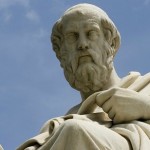We run our website the way we wished the whole internet worked: we provide high quality original content with no ads. We are funded solely by your direct support. Please consider supporting this project.
Love and the Other Attributes of God
If we keep our focus on Christ, we see that God’s power and God’s love are not two separate attributes, as many people assume. As I often state, love is not merely something God does; love is what God eternally is. Everything God does, therefore, expresses perfect love. God’s power, therefore, is simply an aspect of his love, the love that is defined by the cross.
When God demonstrates his love by giving up his life on Calvary (Rom. 5:8), he is, at the same time, expressing the true nature of his power. Though the cross looks weak in the eyes of the world, in truth it is the only thing that could defeat Satan, overcome all evil, liberate humans from our self-inflicted bondage and ultimately transform the whole cosmos into the Kingdom of God. No amount of power to control people and crush enemies could have hoped to accomplish this.
The same thing must be said of all the other attributes of God. All of them are ultimately expressions of God’s servant love. Here are a few examples of what we’re talking about.
Scripture teaches that God is everywhere (he is “omnipresent”). Since God’s very essence is love, the primary meaning of this teaching is that it’s impossible to hide from God’s love. Even if we make our bed in hell, Scripture teaches, we’re surrounded by God’s triune love (Ps. 139:7-10).
Scripture teaches that God never changes (he is “immutable,” see Ps 102:25-27). Since God’s very essence is love, the primary meaning of this teaching is that it’s impossible for God’s love to ever waver. His love is perfect and unwavering and it endures forever (Ps 36). The immutability of God’s loving character is marvelously expressed in Scripture’s repeated emphasis on God’s faithfulness and trustworthiness.
Scripture also teaches that God knows everything (he is “omniscient”). Since God’s very essence is love, the primary meaning of this teaching is not merely that God knows all the facts that exist, but that God is intimately aware of every facet of our being. As David says, God searches our heart and knows our innermost thoughts and feelings, even before we do (Ps. 139:1-2).
Finally, Scripture teaches that God is “holy.” While this attribute is frequently associated with God’s strict rules and burning wrath against sin, the biblical word for “holy” (Heb 12:16) denotes something set apart, utterly unique and other-worldly. Since God’s very essence is love, the primary meaning of God’s holiness is that God’s perfect love is different from the kind of fickle and shallow love we usually experience in our world.
We see that when we keep our focus on Christ as the definitive revelation of God and therefore understand that God’s very essence is love, the various attributes of God can be seen as simply different ways God’s love is put on display, like light flowing through a prism creating a rainbow of distinct colors. When our focus strays from Christ, and more specifically the love displayed on the cross, however, we invariably begin to define God’s attributes according to our own fallen tendencies.
Category: General
Tags: Attributes of God, Character of God, God is Love, Love
Topics: Apologetics
Related Reading

What the Resurrection Says About the Cross
As with every other aspect of Jesus’ life and ministry, even the resurrection must be understood in light of the cross. This event was not just the resuscitation of a random corpse. It was the resurrection of the Incarnate Son of God who had fulfilled the human side of the God-human covenant by living a sinless…

Friday Lights: Glimpse of the Kingdom
We interrupt the constant stream of violence and brokenness to bring you this glimpse of the Kingdom of God. Image via broken pencils are pointless

Prayer and Co-Reigning with God
God’s primary objective is a world in which free agents love God and one another. For this to be possible, people need a stable environment and freely chosen, irrevocable, morally responsible say-so. Prayer is simply the spiritual side of our morally responsible say-so. We influence things by what we do through our bodies and in…

Is Your Christianity Shaped by Plato or the Bible?
The Timaeus is a work that Plato wrote that addresses the questions: “What is that which always is and has no becoming, and what is that which becomes but never is?” (Tim. 28a)? These questions contain one of the most influential – and, in my opinion, one of the most disastrous – philosophical ideas of…

From Good Friday to Easter
This weekend as you contemplate the suffering, death and resurrection of Jesus, we pray that God will reveal his unfathomable love for you in new ways. Blessings to all of you from all of us at ReKnew. Photo credit: Claudio via Visualhunt / CC BY

Lighten Up: Listening for the Voice of the Father
Christian comedian Michael Jr. posted this video last week for Father’s Day. What it says about love and connection and God in just a few minutes is so lovely. Enjoy.

